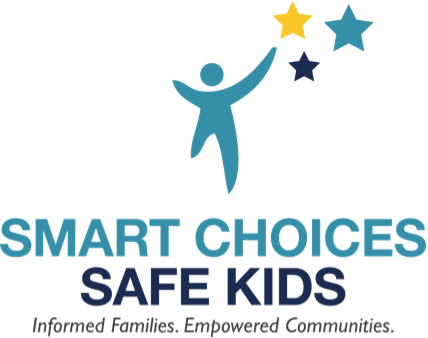Life with young kids
There are so many things to think about when you have young children. Here are a few tips to help keep your children healthy and safe.
Overview
+ Caring for Kids Responsibly
Supervising Children & Substance Use
If you use alcohol, marijuana, or prescription medication, ensure your children always have a safe and responsible caregiver. A person may be too drunk, high or medicated to be able safely care for and supervise children, or respond effectively in a crisis.
- Practice Safe Storage – All alcohol, tobacco, marijuana, medications, drugs and hazardous household chemicals (including detergent pods) should be stored in their original packaging and in a locked cabinet, out of sight and out of reach of children. In the event of accidental ingestion of any substance or hazardous chemical contact poison control immediately (1-800-222-1222) or call 911.
- Cars & Driving – Do not drive while impaired, and do not let your child ride in a car with anyone who is impaired. Alcohol, drugs, medication, sleep deprivation, and medical issues can all impair one’s ability to drive safely.
- Know the Risks – Engaging in illegal activities, using street drugs, or abusing legal substances puts your child at additional risk.
Find Trustworthy Caregivers
Make sure that anyone caring for your children is:
- Engaged with them, providing developmentally appropriate care and supervision.
- Prepared to respond effectively in any crisis.
- Knowledgeable about key aspects of child care, such as: how to calm a crying baby, how to ensure that a child is sleeping safely, and so forth.
Learn More about finding the right caregiver here.
+ Tips for Healthy Babies & Young Children
Below are key ways to ensure your kids' healthy development:
- Safe Sleep – Ensure your baby or toddler has a safe sleeping arrangement – on their back in their own bed without any blankets, bumpers, or toys.
- Breastfeeding – Breastfeeding has many health benefits for both mom and baby and provides the healthiest start for a baby. Learn more about the use of alcohol and substances while breastfeeding and talk to your health care provider about breastfeeding and alternatives to determine what works best for you and your baby.
- Learn How to Calm a Crying Baby – Make sure you and everyone caring for your child knows how to calm a crying baby.
- Promote Stability – Provide consistent routines around meals, naps, and bedtimes. Teach your children about feelings, model expected behavior, and help them learn problem solving skills.
- Show your Love – Love and nurturing is a critical part of bonding and brain development in babies and toddlers. Take a little extra time every day to connect and engage with your children – snuggle, sing, talk, smile, love.
- Stay up to Date on Parenting & Child Development – Parenting is part natural and part learned. Talk to friends, family, and your child’s pediatrician about your child’s growth and development. Take a class or read about raising children and what they can do at different ages.
+ Self-Care & Support
Take Care of Yourself – Reenergize yourself, whatever that means to you — walk, dance, laugh, exercise, take a bath, read, manage stress, share your feelings, spend time with friends and/or family.
Build a Support System – Surround yourself with people that help out and provide emotional support on a daily basis and in times of need. Join a playgroup, support group or faith community; get involved in your neighborhood, city or school.
Postpartum Depression - 1 in 8 women suffer from postpartum depression. Untreated depression may be harmful to you and your baby. If you feel sad or hopeless, you are not alone and treatment is available. Talk to your healthcare provider about how you are feeling emotionally as well as physically.
+ Information & Resources
Children's Hospital Colorado: Learn how to calm a crying baby.
Postpartum Support International: Information and resources for people experiencing postpartum depression.
Safe Kids Worldwide: Helpful tips for car seat safety.
Safe Sleep: A helpful checklist to ensure safe sleep for your baby.
Zero to Three: Learn about early child development spanning the first 3 years of a baby's life.
Ask for Help
Not sure if your baby’s development is on track? What’s that rash? Don’t be afraid to call your child’s health care provider or ask for help. Call 1-800-CHILDREN (244-5373) or 1-866-LAS-FAMILIAS (527-3264) for free, confidential help finding drug treatment, parenting support, medical care, social and family service agencies, and many other resources. Learn more.
Related Topics
Substance Use & Young kids
Click on a substance to learn more.

